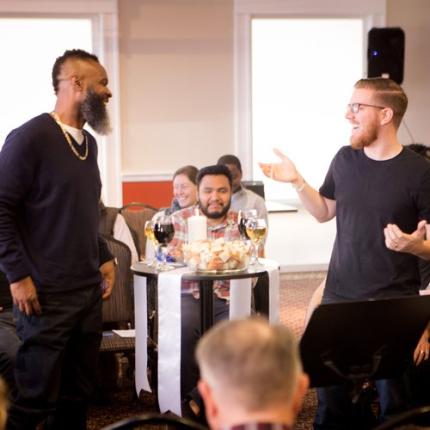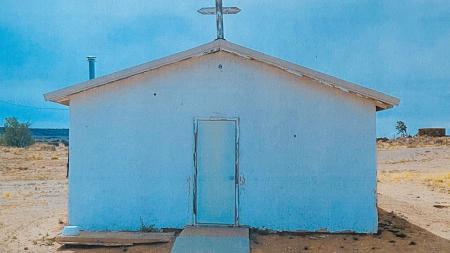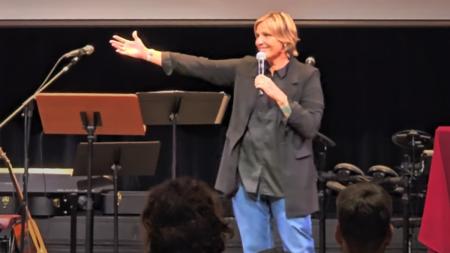Sharing ‘New Wineskin’ Stories

Bernard Emerson and Kyle Brooks
This is the third in a series of stories on new ministry approaches emerging out of the recent Glocal Mission Summit, which met April 1-3 at Ttkomsa Mission Church in Los Angeles, Calif.
Click here to view first story and here for the second.
Though he had lived in the area for a while, Brian Tebben didn’t get to know the people who lived in his Salt Lake City, Utah, neighborhood till he was forced to stay home for several months because of a hiking accident.
After moving in, he had been busy with all the normal duties and responsibilities of being a pastor at the nearby Life in Christ Christian Reformed Church.
Tebben said he might wave and perhaps talk briefly to his neighbors as he was on his way to visit someone in the hospital, attend a church council meeting, or head out to conduct the Sunday service.
But then one day while he was hiking, he had a major accident. “It completely slowed me down. I couldn’t do much — so I met my neighbors,” said Tebben, one of several people who shared stories of their ministry at the Glocal Mission Summit held Apr. 1-3 at Ttokamsa Mission Church in Los Angeles, Calif.
Storytelling was an important part of the event sponsored by Resonate Global Mission and its Mission Innovation Team as a way to highlight the work ministry leaders have been doing in the past two years since Christian Reformed Home Missions and Christian Reformed World Missions united to become Resonate.
Including Korean, Hispanic, Chinese, Southeast Asian, African American and Native American leaders, the summit had the theme of “New Wineskins for Mission Everywhere.” Throughout the gathering participants read, reflected on, and discussed Luke 5:31-39, in which Jesus speaks of the significance of pouring new wine into new wineskins.
New approaches to ministry were on everyone’s minds as the storytellers spoke.
In Salt Lake City, said Tebben, he experienced a new awareness — a sense of “new wine” — when he began walking through his neighborhood as he started healing from his accident and feeling better. One of the first people he got to know was Gordon.
Shunned by the Mormon Church in which he grew up, Gordon, who is gay, told Tebben that he had no support in his life and would have no one to call if he were laid up in his house after a serious accident.
Tebben also got to know Maxine, who started drinking at 8 a.m. every day and whose son was dying of AIDs. “It didn’t cost millions of dollars to meet my neighbors,” he said. Through them, Tebben said, he saw things he had missed for years, and his eyes were opened to new ministry possibilities.
Ranging from the Pacific Northwest to the East Coast of the U.S. and parts of Ontario and beyond, the storytellers came to offer looks at the “cutting edge of urban ministry,” said Joel Van Dyke, a mission innovation leader for urban mission with Resonate Global Mission, who introduced some of those speaking at the summit.
“We are living in an exploding urbanized world, and the CRCNA needs to pay attention to what is happening around us in these complex urban settings,” he said.
Among the ministry leaders who are paying attention, said Van Dyke, are Kyle Brooks and Bernard Emerson, who are stepping into uncharted waters as they build a church called the Tapestry in Oakland, Calif. As the congregation has begun to grow, they have instituted a fresh model of leadership in a CRC setting.
Brooks, who is white and an ordained CRC pastor, serves as the associate pastor and Emerson, who is African American and a Baptist minister, is senior pastor.
A few years ago, the two of them became acquainted, and it didn’t take long for them to become friends and start talking about merging their two churches.
Emerson, a lifelong Oakland resident, started The Way Church in Oakland four years ago. A year later, Brooks, a Resonate partner missionary, planted Oakland Communion. In 2018, the two congregations joined to form Tapestry Church.
It has been a long process that began with the two pastors looking at the issue of racial reconciliation in their own lives. “We became better brothers than pastors. My partnering with Kyle trumped my blackness,” said Emerson.
“We had to reimagine what the kingdom of God would look like here in Oakland, but we couldn’t do that if we didn’t know one another deeply,” said Brooks.
They recalled taking a walk together through Oakland, passing homeless people and multimillion-dollar mansions being built by high-tech executives. They saw the super-rich and the ultra-poor and the people in between as their mission field.
With the approval of their separate congregations, they began to move forward to merge. “But before we did, we had to deal with the issue of power,” said Brooks. “We decided that we needed Bernard to be the lead pastor. The issue of authority was important. Today, we draw a wide range of people — Asians, Latinos, no majority culture — to Tapestry.”
After one of the discussions about the new wineskins passage in Luke 5, Beth Fellinger, pastor of Destination Church in St. Thomas, Ont., stood up to offer a few thoughts on the Bible verses.
Among other things in this passage, Jesus says, “No one pours new wine into old wineskins. Otherwise, the new wine will burst the skins; the wine will run out and the wineskins will be ruined. No, new wine must be poured into new wineskins. And no one after drinking old wine wants the new, for they say, ‘The old is better.’”
While we might take this to say that there is never going to be change, Fellinger suggested, “What is new is the method and context into which we offer the message” of God’s love for the world.
Pastoring out of a former bar on the main street in St. Thomas, Fellinger has found many ways to serve the needs of the local community. One of the latest, she said, is to listen to the stories of Indigenous people, many of whom are still dealing with the effects of having been forced to attend government-run, residential schools.
Fellinger spoke of Fred, now 38, who told of being removed from his parents’ home when he was young. His experience at the residential school was horrific. He was raped at the age of eight and forced to keep it quiet, and then at 16 he was sent home to his family, who by then hardly knew him and rejected him.
“Fred became an alcoholic and joined a motorcycle gang because it made him feel like he belonged,” said Fellinger.
During that period, when he was drinking one day, Fred fell down a flight of stairs. He was rushed to the hospital in critical condition. The doctors thought he was going to die. But while lying in a hospital bed in a coma, he came back to life, he told Fellinger.
And as he did, experiences he had had with God in the past took hold, he said. Fred heard the “Creator speak to him and tell him he would be led out of his blindness,” said Fellinger. “We need to listen and really hear stories such as Fred’s.”
With the help of a grant from Resonate, Destination Church holds a prayer-circle event each week around which people like Fred can tell their stories. “Pain and tears happen together around the circle,” said Fellinger.
“We see God doing incredible things. By hearing and listening and walking with people through their pain, we see God restoring things that have been broken.”
Another story at the summit came from Beth Grimmius, who told how she and her husband, Randall, have taken many children into their home in Visalia, Calif.
In particular, she shared some news about Erica, who was a tough young woman living on the streets before she came to stay with them. “Erica was loud and crazy, and she knew everybody,” said Grimmius. “No one ever thought she would stop doing drugs and come to the Lord.”
But one night Erica arrived at their doorstep, strung out and desperate. They weren’t sure what to do at first, but they let Erica in, and she started her rehabilitation right there in their home, said Grimmius.
“Erica is one of those rare stories of transformation,” she said. “When she came to us, she was weary to the marrow of her bones. But God got hold of her and turned her around. . . . [And now] Erica is going to get married.”
Listening to the storytellers talk about their commitment to finding fresh ways for ministry gave him hope for the church and made him think, said Joel Van Dyke, “that old wineskins can’t contain all of this passion.”
Lisa Carlson is one who carries her commitment and passion into finding ways to stand by people living along Aurora Avenue, a street leading into downtown Seattle, Wash., that is known for poverty, the sex trade, and drug addiction.
Carlson serves at Aurora Commons which calls itself a “living room” for which people such as Gene Northrope, who is homeless, can come to cook food, wash their clothes, meet with and talk to their friends, lounge on comfortable couches, or speak to Carlson and others who work or volunteer here.
The focus at Aurora Commons, said Carlson, is on opening the doors to people “who live in the zone of social abandonment. Many of us can hide our burdens and addictions behind walls, but these are people” whom most of us see as “an annoyance that we don’t even want to recognize.”
Few places in Seattle or elsewhere are interested “to acknowledge them, to see their goodness, to greet them, and to ask them their true names,” said Carlson.
She told the story of a 20-year-old woman with whom she ate dinner one day. The woman explained that she’d been on the streets for years and had never had her own space in a home. Then the woman left Aurora Commons, and Carlson, returning home after work later, saw her under the starry sky doing drugs in a nearby park.
“We experience and see some hard things. We don’t judge, but try to be a midwife and be present to the moment to allow the Holy Spirit to do its work. We are out there showing the absurdity of the love of Christ.”


